Academic Recovery Course from Pacific Crest
25 years of experience in helping students become better learners
The Academic Recovery Course: Its Scholarship-Based Practice
Pacific Crest used 25 years of research and practice
of the Academy of Process Educators to integrate Learning to Learn,
Self-growth, and Process Education philosophy in the design and
implementation of the Academic Recovery Course.
The theory developed for Learning to Learn started in 1990 and has advanced through 20 years of Learning to Learn Camps’ implementations and research. One of the earliest papers, Everyone Can Learn to Learn (1993), articulated that learning can be improved by implementing the philosophy of Process Education and its ten principles and the Classification of Learning Skills. The Learning Process Model followed by the Learning Process Methodology became the critical, explicit representation of how people learn. As Learning to Learn was combined with the Theory of Performance, learning began to be viewed and presented as a performance and the components of learning performance were clarified in Learning How to Learn: Improving the Performance of Learning.
Process Educators identified in the mid 1990’s the need to create a freshmen experience in a paper called a Foundations Course for Learning. The next year a team transformed the Learning Through Problem Solving curriculum into the Foundations of Learning (1995) and this curriculum advanced over the next 20 years. A new book, Learning to Learn - Becoming a Self-grower (2013),was developed upon request from current users of the Learning to Learn Camps to reverse engineer the Learning to Learn Camp into a course. It is this curriculum that has become the basis for the Academic Recovery Course. The course was then adapted in an online implementation.
In parallel, Process Educators discovered that the
creation of
a quality learning
environment and a
growth culture is essential. The
Transformation
of Education illustrates the different aspects of educational
culture and the associated transformations needed to create a learning and
growth culture. The
Impact of Higher
Education Culture on Student Mindset and Success articulates
the reasons why students’ current mindsets lead to
risk factors and
why the transformation of culture leads to the development of
Key Learner
Characteristics for Academic Success that mitigate risk
factors. The Professional’s Guide to
Self-Growth (2018) is the documentation of how transformational the
recovery course can be.
Another major component of the Academic Recovery
Course is based upon the growth mindset and the Process Education mindset
of self-development. The history of the language, practices and
scholarship of
Process Education
describes how
important self-growth capacity is to life success. There are ten components defined in
What is Self-growth?
that are integrated in the course to produce self-growth. Self-assessment
and
reflection on
performance using tools such as
a
Learning Assessment Journal illustrate how powerful
they are in producing self-growth. The Life Vision Portfolio
(2002) helps the learners clarify their passion, how to use mentors, and
also illuminates the many ways of self-challenging in the
GVSU
Recovery Course. The
design has the students producing an Academic Success Plan that requires
students to clarify the expectations and performance criteria of courses
to be re-taken and develops detailed course learning plans. The
self-growth papers (under review) illustrate that students have developed
emotional intelligence and grit to achieve a high level of success.
A major component in the success of the recovery
course and its outcomes is the performance of the facilitator. The
Faculty Guidebook (2007) has a whole section on facilitation that
includes a profile of a quality facilitator, how to identify learner
needs, and a process for creating facilitation plans. The guidebook also
has a section on mentoring that explains how to do constructive
interventions. The facilitator
uses the
Mentoring Methodology to
implement many of the
100 Best Practices for
Teaching Learning to Learn and Self-Growth. Pacific Crest has developed 23
professional
development institutes to support the development
of learning to learn facilitators and
Online
Teaching Learning to Learn Institute.
Additional Reading
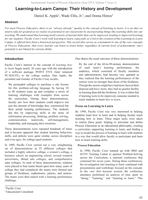
Learning-to-Learn Camps: Their History and Development
Pacific Crest’s work with learning to learn, especially as it led to the creation of the Learning-to-Learn Camps, is offered here from a historical perspective. This record also serves as a testament to one of the core concepts of Process Education: that every learner can learn to learn better, regardless of current level of achievement; one’s potential is not limited by current ability.
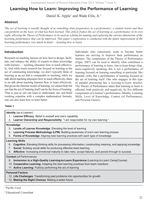
Learning How to Learn: Improving the Performance of Learning
The act of learning is usually thought of as something done preparatory to a performance; a student learns and then can perform on the basis of what has been learned. This article frames the act of learning as a performance in its own right, allowing the Theory of Performance to be used as schema for naming and exploring the various dimensions of the learning performance that can be improved.
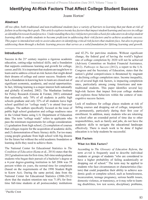
Identifying At-Risk Factors That Affect College Student Success
All too often, both traditional and non-traditional students face a variety of barriers to learning that put them at risk of failure in achieving their goals. This article explores twenty key factors that impact student learning and success in college as identified in research and practice. Understanding these key risk factors allows educators to help students address their risk factors and achieve academic success.
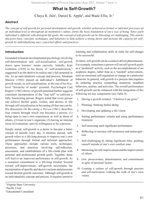
What is Self-Growth?
The concept of self-growth for personal development and growth, whether achieved as formal or informal processes at an individual level or throughout an institution’s culture, forms the basic foundation of one’s way of being. The concept of self-growth is both liberating and challenging. This article discusses basic concepts, techniques, and behaviors to help achieve a strong desire and increase the capacity for self-growth by individualizing one’s concerted efforts and practices.
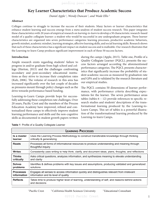
Key Learner Characteristics that Produce Academic Success
Colleges continue to struggle to increase the success of their students. Many learner characteristics that enhance student learning and success emerge from a meta-analysis of student success research. This paper integrates these characteristics with 20 years of empirical research on learning-to-learn to develop a 50 characteristic research-based model of a quality collegiate learner: a student who would be successful in any undergraduate program.